I WAS reading an article about the several ways a person could lose body fat based on scientific research, and thought I could add some value on most of those listed.
What follows is a summary of the science of losing body fat, nine methods in total, followed by a deeper look at some of them, with links to articles that delve deeper into each subject.
All nine ways of losing body fat are unlikely to appeal to you, but grab at lest two that seem appealing and go for it.
These are the nine science-backed methods to lose body fat:
- Intermittent Fasting — Either alternate day fasting, the 5:2 diet (two days of under-eating), or the 16/8 method (what I do).
- Track your diet and exercise — There’s a positive correlation between consistent tracking of physical activity and food intake and weight loss.
- Eat mindfully — Eat slowly, intentionally, no distractions (like TV).
- Eat protein for breakfast — Helps you feel full because protein decreases the hunger hormone ghrelin and increases the satiety hormones peptide YY, GLP-1, and cholecystokinin. READ……..
- Reduce sugar and carbs — Both sugar and carbs (referring to simple, non-complex high glycemic carbs) quickly enters your blood as glucose and boosts the hormone insulin, which will make fat (storing it in adipose tissue) from excess glucose not used by the body for energy.
- Eat lots of fiber — Dietary fiber is plant-based carbohydrates that is not possible to digest in the small intestine, such as veggies, beans, legumes, nuts and seeds, which feed the beneficial bacteria in your gut and increase the feeling of fullness, potentially leading to weight loss.
- Balance gut bacteria — Our guts contain tens of trillions of various microorganisms that can help improve/support our health or promote illness. The “beneficial bacteria” dominate “harmful bacteria” when we eat plants, fermented foods and prebiotic foods. Some bacteria can even help us lose weight.
- Get a plenty of sleep — Less than five to six hours of sleep per night is associated with increased incidence of obesity, because metabolism is impaired with insufficient or poor-quality sleep and the body thereby may store unused calories as fat.
- Manage your stress — People under sustained stress stay in a “flight or fight” response whereby their body continually produces adrenaline and cortisol. Cortisol influences the body to use carbs as its fuel source. Insulin then transports the sugar from carbohydrates from the blood to the muscles and brain. If the person does not use this sugar in fight or flight, the body will store it as fat.
Let’s go a bit deeper on some of these, beginning with Intermittent Fasting.
Intermittent Fasting – Do It Your Way
There are three things about Intermittent Fasting (IF) that I’d like you to know about that might persuade you to try one method or another.
#1 Intermittent Fasting ignites cellular autophagy (cellular self-cleaning)
Dr. Yoshinori Ohsumi won a Nobel Prize for proving that eating less improves healthspan and possibly lifespan through a process called “cellular autophagy.
Cellular autophagy is a crucial process for cells to survive and stay healthy, says the New York Times, which translates to your survival and health. During a period of ingesting limited calories, not only do cells break down proteins and nonessential components and reuse them for energy, but also cells use autophagy to:
- Destroy invading viruses and bacteria; and
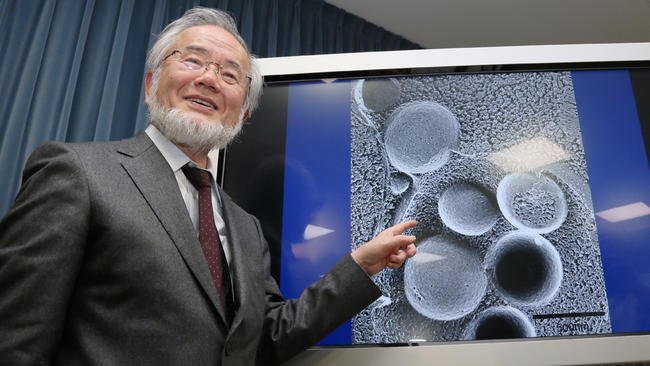
Dr. Yoshinori Ohsumi
- Rid themselves of damaged structures; a process which…
- Is thought to get disrupted in cancer, infectious diseases, immunological diseases and neurodegenerative disorders; including Parkinson’s disease, type 2 diabetes and cancer.
Read How Intermittent Fasting Fasting Ignites Cellular Autophagy, and A Longer, Healthier Life.
#2 Intermittent Fasting helps you lose weight by optimizing insulin and leptin
Dr. Jason Fung is recognized as one of the world’s leading experts on fasting for weight loss and diabetes reversal. He is the author of several books, including The Complete Guide to Fasting (co-authored with Jimmy Moore) and the bestselling The Obesity Code.
He wants you to understand this:
- How many calories you consume is not as important as how well your ghrelin, insulin and leptin hormones function.
- Intermittent Fasting helps make these fat-busting hormones work together better, because not making your body deal with incessant food consumption (three meals plus snacks every day) enables ghrelin, insulin and leptin to reset and be more responsive when you do eat.
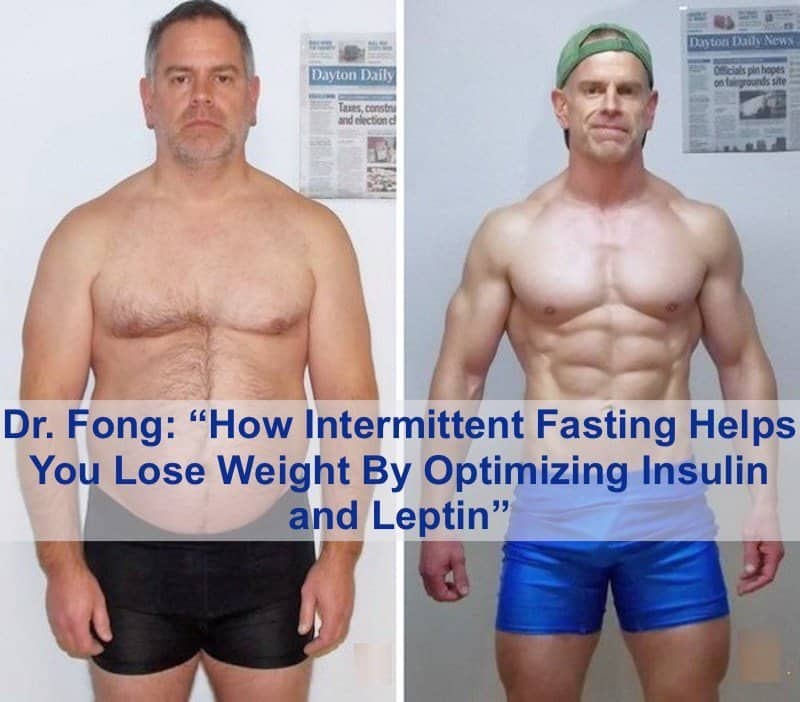
(Click image to read and watch video.)
#3 Do Intermittent Fasting the way that will work for you
Renown nutritionist Dr. John Berardi has three favorite IF methods that work great, he says, and there are others you may explore as well.
I cover several IF methods in Choose Your Favorite Intermittent Fasting Protocol (and watch the fat melt away). One will be perfect for you.
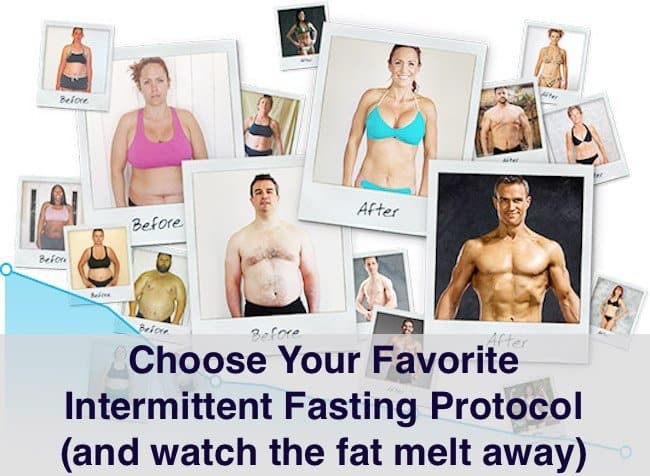
(Click image to read the article.)
Eat Mindfully To Lose Weight, Says Harvard
One of the hardest parts about losing weight isn’t choosing what to eat. You know you should focus on fresh, lower-calorie foods and steer clear of sugary, fat-laden treats. Often, the real challenge is more about changing how and why you eat.
One strategy that just might help is the practice of mindfulness, according to a recent review in Current Obesity Reports, which Harvard Health Publishing presents here.
The upshot — you can lose weight by:
- Being mindful if and now your eating is emotionally driven
- Examine your cravings before you succumb to them
- Acknowledge your hunger levels, emotions, thoughts, motivations, and eating environment with acceptance — not judgment — but then take positive actions to overcome whatever instigates over-eating and poor food choices.
As long as we’re on the subject of mindful eating, be mindful that you have a lot of healthy substitutions for the various less-than-ideal food and drink choices you may be making.
Nutrition blogger Amanda Meixner posted a series of “Before” and “After” pictures that show what better food/drink choices are available.
Here are a few that I think are spot on:
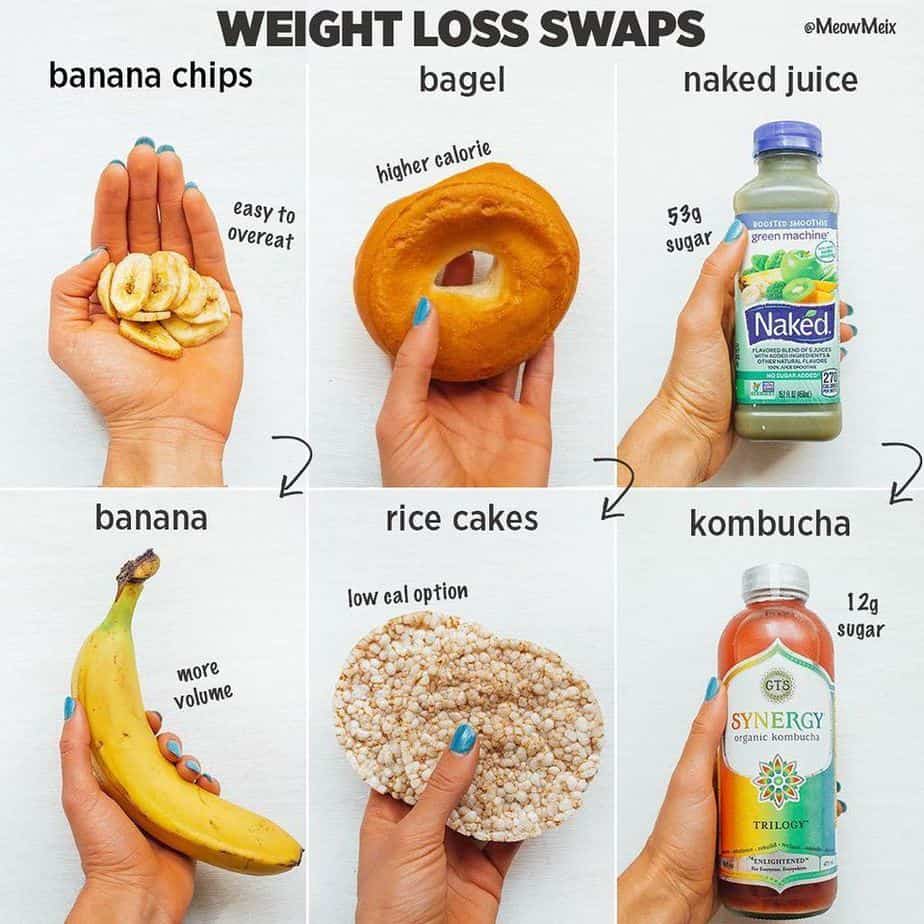
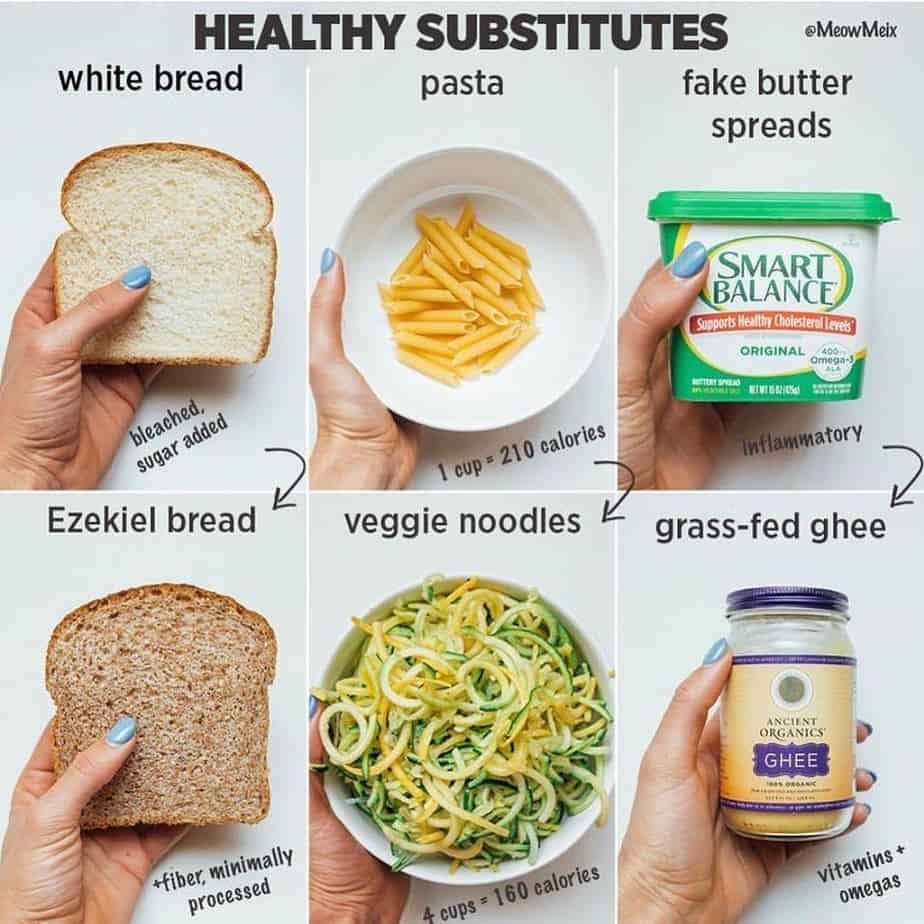
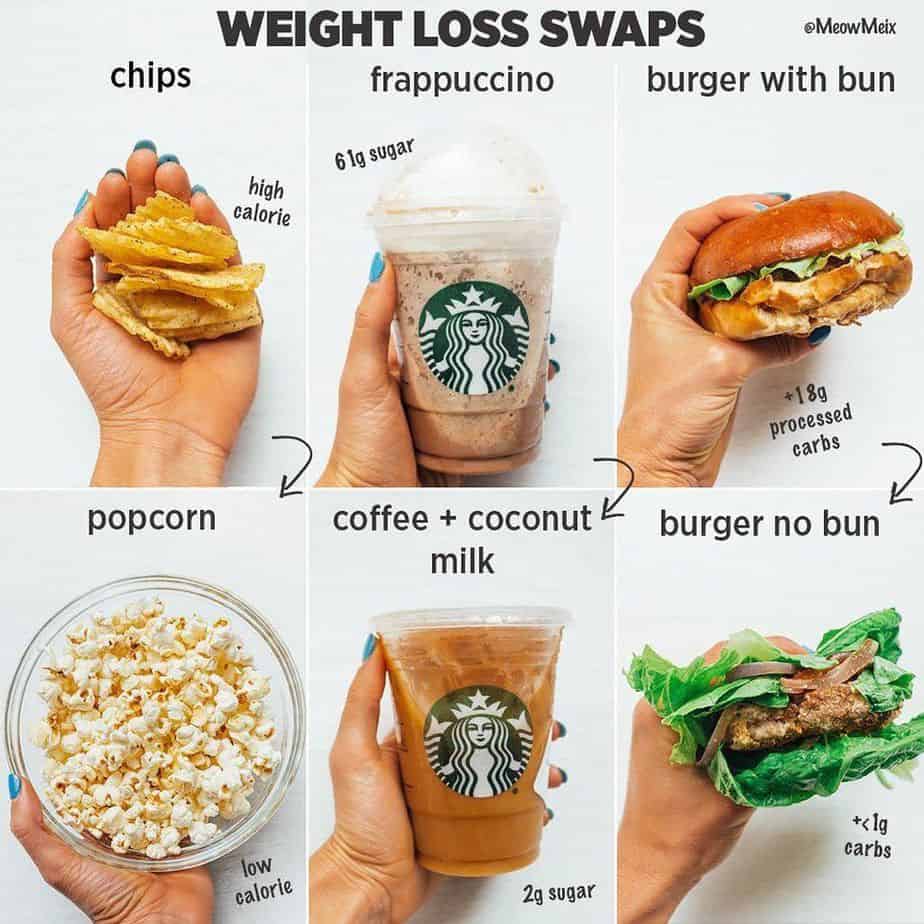
Protein: Eat Some At Every Meal, Not Too Much
Yes, we need protein to repair and grow muscle, particularly as we age and sarcopenia sets in. But unless you’re a bodybuilder, you’re probably getting enough.
Protein products have invaded the grocery shelves with powders, bars, and shakes. Some like yogurt and cereals even boast of their added protein content. But a new story by the BBC today states that most of us don’t need an added protein boost:
“Some experts now argue that foods with inflated protein (and prices) are a waste of money.”
When it comes to protein, the two things to focus on is not protein supplements, but to make sure that:
- Your protein sources are high quality; and
- You try to consume some protein with every meal.
If you’re meat eater, select meat that came from grass-fed, no-antibiotic/hormone injected animals. If you’re a vegetarian, make sure you consume high-protein legumes, and to a limited extend, organic, sprouted soy.
When it comes to the science of losing body fat, on average, protein quotas should be in the 55 gram (2 ounce) range for men and 45 gram (1.6 ounce) range for women, constituting two palm-sized portions of meat, fish, tofu, nuts. Having said that, I don’t measure, and am not advising you to do so; what I am saying is to eat protein with each meal and not to overdo it with protein bars (aka candy) and protein powders.
Read Pump Up Your Metabolism: Eat Protein, Not Wheat.

A high protein diet adds muscle and increases metabolism. Muscle burns seven times as many calories as does fat.
Balancing Gut Bacteria
I’ve touched on this a few times already, but healthy gut bacteria so profoundly affects our health that it’s worth beating the drum about it.
As Science Daily reports, the secret to longevity may lie in the microbiome and gut, given recent experiments in fruit files that show increased lifespan thanks to a combination of probiotics and an herbal supplement.
Yes, I’m fully aware that you’re not a fruit fly, even if you do like bananas. That said, strange is it may seem, fruit flies and humans share a sufficient number of biochemical similarities when it comes to life extension parameters that they — like worms, rodents, dogs and primates — are studied to give scientists ideas on what interventions that work for such creates may succeed with humans.
So, scientists as McGill University fed fruit flies with a combination of probiotics and an herbal supplement called Triphala that was able to prolong the flies’ longevity by 60% and protect them against chronic diseases associated with aging.
Here’s what Satya Prakash, professor of biomedical engineering in McGill’s Faculty of Medicine and senior author of the study had to say about it:
“Probiotics dramatically change the architecture of the gut microbiota, not only in its composition but also in respect to how the foods that we eat are metabolized,” says . “This allows a single probiotic formulation to simultaneously act on several biochemical signaling pathways to elicit broad beneficial physiological effects, and explains why the single formulation we present in this paper has such a dramatic effect on so many different markers.” (source)
If this tickles your fancy, just so happens that Amazon carries Triphala. Of course, there are many probitotics there to choose from as well. To guide you with that, check out my article, Heal Yourself and Become Superman with Specialized Probiotics.

(Click pic to discover recommended probiotics.)
Before we leave the importance of cultivating beneficial gut bacteria, I want to mention research by scientists at King’s College London into the role the gut plays in processing and distributing fat published in Nature Genetics and reviewed in an article in Medical Xpress called, Study identifies processes in the gut that drive fat build-up around the waist.
Lead investigator Dr. Cristina Menni from King’s College London said this:
‘This study has really accelerated our understanding of the interplay between what we eat, the way it is processed in the gut and the development of fat in the body, but also immunity and inflammation.”
Head of the King’s College London’s Twin Research Group, Professor Tim Spector said this:
“This exciting work in our twins shows the importance to our health and weight of the thousands of chemicals that gut microbes produce in response to food. Knowing that they are largely controlled by what we eat rather than our genes is great news, and opens up many ways to use food as medicine. In the future these chemicals could even be used in smart toilets or as smart toilet paper.”
(Can’t wait for that smart toilet paper!)
Dr. Jonas Zierer, first author of the study added this:
“This new knowledge means we can alter the gut environment and confront the challenge of obesity from a new angle that is related to modifiable factors such as diet and the microbes in the gut. This is exciting, because unlike our genes and our innate risk to develop fat around the belly, the gut microbes can be modified with probiotics, with drugs or with high fibre diets.”
As concerns your microbiota (gut bacteria), the science of losing body fat clearly indicates that you can substantially lose weight and improve your health by:
- Not eating sugary foods and drinks
- Eating fibrous foods
- Supplementing with probiotics
- Supplementing with Triphala
Sleep Your Way To Health
I’ve covered the importance of sleep (and how to get some) in several articles, two of which I’d like to quickly summarize.
In 7 Sleeping Tips For Your Ultimate Rest and Restoration, I summarize the Mayo Clinic’s sleep tips:
- Stick to a sleep schedule
- Pay attention to what you eat and drink (and when you do it, I might add!)
- Create a restful environment
- Limit daytime naps
- Get physical
- Manage your worries
- Use sleep-inducing supplements, like melatonin and FibroSleep.
For more on each of these, click here.

(Click pic for more info.)
The other sleep article you might wish to delve into is called, Beyond Sleep: 10 Ways Melatonin Helps You Age Better (Watch).
In the article, I cover:
Here’s why you might want to supplement with melatonin:
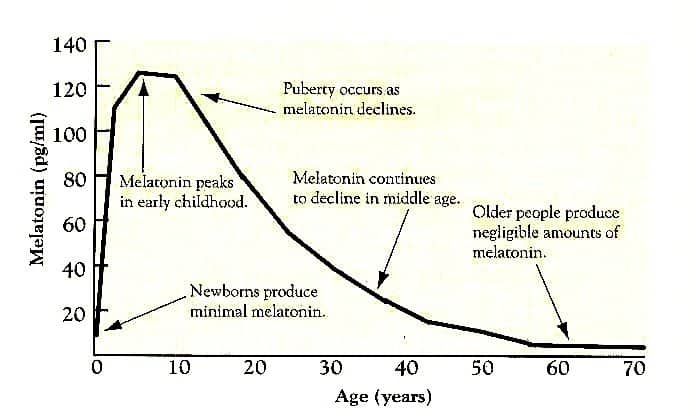

(Click pic to learn more.)
All fine and dandy, you say, but what does all this sleep stuff have to do with losing body fat?
Well, according to WebMD:
- When people are starved of sleep, late-night snacking increased, and they were more likely to choose high-carb snacks;
- Sleep-deprived people choose snacks with twice as much fat as those who slept at least 8 hours;
- Sleeping too little prompts people to eat bigger portions of all foods, increasing weight gain;
- And in a review of 18 studies, researchers found that a lack of sleep led to increased cravings for energy-dense, high-carbohydrate foods.
So, by the science of losing body fat, go get some sleep.
De-stress and Live A Longer, Happier Life
Stress is the last thing I want to cover.
Stress will wear you out. Stress will make you unhappy. Your stress will make those around you stressed.
But the real kick in the pants is what Nobel Laurette Elizabeth Blackburn discovered about long-term, chronic stress — it can shorten your life.
The details are in my article, How Depression and Stress Make Us Age Faster, which begins with this punch:
Stress and depression can produce high cortisol levels that might shorten your life.
But that’s not all!
In the article, I list four ways that chronic stress, via cortisol production, messes with your health, and a fifth that speaks to lifespan:
- High cortisol decreases immunity
- High cortisol increases abdominal fat deposition
- High cortisol breaks down muscle, bone, and connective tissue
- High cortisol inhibits thyroid hormone activation
- High cortisol shortens telomeres
What are telomeres, you ask?
In layman’s terms, are the caps at the end of each strand of DNA that protect our chromosomes, like the plastic tips at the end of shoelaces. Their job is to stop any unwanted loss of this vital genetic code. As cells divide, the telomeres get shorter and shorter. Measuring their length is a way of assessing cellular aging.
Telomeres look like this:
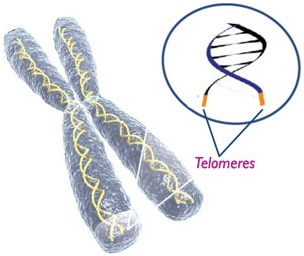
If your life is stress-filled, it’s high time you too a time out and explored some interventions, such as:
- Learn to meditate
- Do yoga or any exercise, even walking
- Supplement with herbal Adaptogens
Find out more about meditation in my article, Meditate Like A Monk In 20 Minutes.
You may start your exercise program by reading, Why You Must Exercise for Longevity and How To Do It.
Learn about the Adaptogens and other stress-relieving supplements in my article, How To Fix Your Adrenals and Rev Up Your Life.

(Click image to learn more about meditation)

(Click image to learn more)

(Click image to learn more about adaptagens, cortisol and adrenals)
You’ve been presented with the science of losing body fat in nine different ways. Choose two and get going:


















